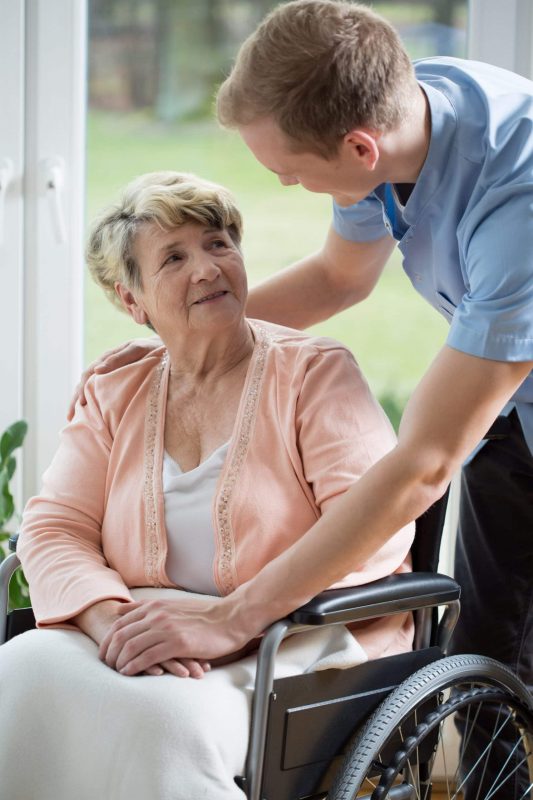What is companionship care?
Home care is not always just about a person’s medical and personal care needs. It is also about having someone to talk to and accompany you when out and about; a confidant who supports you with your hobbies and interests and enables you to do the things you love.
Companionship care, often referred to as companion care, is a great source of comfort, especially where a person may feel lonely or isolated. As a friendly, familiar face, your carer can take you places you want to visit, support you around the house, or even share memories over a cup of coffee.
Visits can be as frequent and for as long as you like and can be very much a highlight of your week. The best thing is, with a caring companion by your side, you’ll be able to enjoy life and even discover new hobbies and places of interest.
What are companionship services?
At Nayland Care, we take a person-centred approach to home care, which is why all our services offer an element of companionship care. This is because we are passionate about matching you with the right carer – someone who we know you will enjoy spending time with.
Companionship care is not always part of a blended home care plan though. Often, the service is the only one required since it can have a positive impact on somebody struggling with loneliness.
Usually companionship services offer company – whether that’s an afternoon reminiscing in the garden or a morning walking along the coastline. The choice is yours. Your carer will be guided on what you wish to do. If you have a social event but would like someone to take you there and accompany you, your carer will be happy to do so. And if you have specific medical challenges, they are expertly trained to help. Likewise, your carer can help with running errands such as shopping, going to the post office and taking you to the doctors.
What are the benefits of companionship care?
Most people say that as they age, or their illness progresses, they would like to stay at home, but not at the expense of feeling lonely or isolated. That’s where companionship care comes in.
Companionship care can meet multiple challenges at once. It can:
• Provide practical assistance with everyday errands (shopping and paying bills)
• Promote friendship and emotional support
• Reduce isolation and improve social interaction
• Give respite to family members, giving them a chance to recharge and relax
Since companionship care has its roots in helping the whole person, it can be really liberating. For people struggling to leave the house, a few hours of companionship each week, can be incredibly beneficial to their overall health.
How do you get started with companionship care?
Nayland Care makes it very easy to get started with companionship care. When you contact us, we will schedule a free consultation with you and a family member (if you wish). Following this consultation, we will create a person-centred companionship care plan, taking into account your wishes, needs, and affordability.
Once we have developed your care plan, we will match you with a carer who we know will be a great fit for you; someone you’ll enjoy the company of and who you can trust to care for you.
What is the difference between companion care and personal care?
It is easy to confuse the two if you are new to home care services. However, companion care is where the carer is there to offer companionship – sharing in conversation, accompanying you shopping, visiting a garden centre, or taking you swimming etc... They are there to help you fulfil your emotional and social needs.
Personal care, on the other-hand, is about providing you with physical assistance with activities such as bathing and dressing. Although, there is always an element of companionship care with any Nayland Care home care plan.
Why is companionship important?
Having somebody to talk to and share your life experiences with, whether a friend, family member or carer, helps keep the mind in a positive place and prevents isolation.
Laughing, conversing, sharing, and relaxing with other people is well-known to positively impact our mental and physical health.
Sadly, research by Age UK reports that around half a million older people do not see or speak to another human being for around five days. Living alone contributes to isolation, which is why having companionship is important, even if it is for just a couple of hours each week.
Needless to say, companionship care has become a popular home care service in recent years. Having a familiar home carer visit a couple of times a week, or even daily if required, can be incredibly uplifting, especially when the carer builds a wonderful rapport with their client.
Many of our clients who use Nayland Care’s companionship care at home Suffolk service report looking forward to their companion visiting them and accompanying them out and about.
For those with caring responsibilities, having companionship care at home can be a real benefit as it can provide regular respite.
What are the long-term benefits of companionship care?
The long-term benefits are different for each person. However, research shows that being less isolated can improve a person’s outlook, health and quality of life.
Having companionship care can also increase a person’s confidence in social situations so that they feel more able to attend certain events on their own. It also encourages greater enablement and overall independence. The positive impact on a person’s wellbeing is clear to see and is evidenced in personal care reviews.
Companionship care can also help a person’s memory. Sharing stories with someone new is a good exercise for the brain, which can help with other daily activities too.
Having someone, to trust and turn to also allows a person to have honest conversations about how they’re feeling. The companion is also likely to recognise the signs of when the person they are caring for may not be quite right, prompting a medical check-up.
What exactly is included in companionship care?
You could ask two people what their companionship care support looks like, and they will give you two different answers. That’s because we’re all different. We like doing different things, have our own routines and ideas of being ‘social.’
For one person, companionship care could mean taking them swimming or to the shops, while for another, it could mean having a carer round for a cup of tea and a chat.
Most companionship care plans offer some or all the following though:
• Social interaction when out and about
• Emotional support
• Company and someone to participate in hobbies with
• Having someone to talk to and confide in
• Support with day trips out and using public transport
Quite often, companionship care is part of a broader personal care plan. Sometimes this may mean that a personal carer has a couple of different roles. For example, as well as being a companion they may help you with your personal care needs, do a little light housekeeping or support you with your medication.
Essentially, companionship care at home eases the feeling of loneliness and supports a healthy life.












